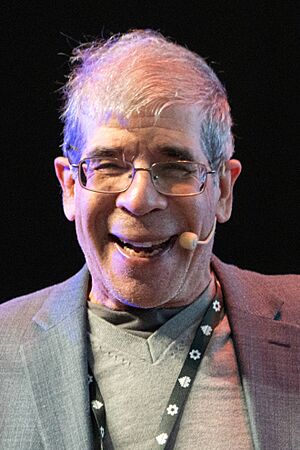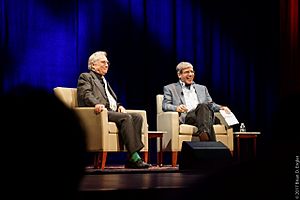Jerry Coyne facts for kids
Quick facts for kids
Jerry A. Coyne
|
|
|---|---|

Coyne in 2024
|
|
| Born |
Jerry Allen Coyne
December 30, 1949 |
| Nationality | American |
| Alma mater | College of William & Mary (BS) Harvard University (PhD) |
| Known for | Speciation and evolutionary genetics, particularly as they involve the fruit fly, Drosophila, and the books:
|
| Awards | Richard Dawkins Award (2015) |
| Scientific career | |
| Fields | Ecology Evolution |
| Institutions | University of Chicago University of Maryland |
| Doctoral advisor | Richard Lewontin |
| Notable students | H. Allen Orr, Mohamed Noor |
Jerry Allen Coyne, born on December 30, 1949, is an American biologist. He is well-known for his studies on how new species form, a process called speciation. He also shares his thoughts on intelligent design, which is a belief that life is too complex to have evolved naturally.
Coyne is a professor emeritus at the University of Chicago in the Department of Ecology and Evolution. He has written many scientific papers about the theory of evolution. His main focus is on speciation and the genetics of how living things change over time, especially using the fruit fly, Drosophila, in his research. In 2023, he became a fellow with the Committee for Skeptical Inquiry.
He wrote a textbook called Speciation and a popular non-fiction book titled Why Evolution is True. Jerry Coyne also runs a website and writes for his blog, which is also called Why Evolution Is True. He is a strong supporter of science and critical thinking.
Coyne is also known for being a public supporter of science over religious explanations for the natural world. He is often mentioned alongside other thinkers like Richard Dawkins and Sam Harris. He wrote another book called Faith Versus Fact.
Contents
Early Life and Education
Jerry Allen Coyne was born on December 30, 1949. He grew up in a Jewish family. In 1971, he earned a Bachelor of Science (B.S.) degree in biology from the College of William & Mary. He received the Botetourt Medal for his excellent academic work.
While in college, Coyne was involved in activism. He protested against apartheid, which was a system of racial separation, and the Vietnam War. He started his graduate studies at Rockefeller University with Theodosius Dobzhansky. He later earned his Ph.D. in biology from Harvard University in 1978, where he studied with Richard Lewontin. After that, he did more research at the University of California, Davis.
Career Highlights
Jerry Coyne has received many honors for his work. In 1988, he was awarded a Guggenheim Fellowship, which supports people doing important research. He was also chosen to be a member of the American Academy of Arts and Sciences in 2007. In 2011, he received the Emperor Has No Clothes Award from the Freedom from Religion Foundation.
Coyne has held important roles in the scientific community. He served as Vice President in 1996 and President in 2011 for the Society for the Study of Evolution. He was also an editor for scientific journals like Evolution and The American Naturalist.
He has taught various subjects, including evolutionary biology, speciation, and genetics. He believes that evolutionary biology is beautiful and true, like a fine art.
His writings have appeared in major scientific journals such as Nature and Science. He has also written for popular publications like The New York Times. His research explores how populations change over time, how new species form, and how genes influence traits.
In 1996, Coyne wrote an article for The New Republic that criticized the idea of intelligent design. This article began his long history of writing about evolution and creationism.
A type of frog from Ecuador, called Atelopus coynei, is named after Jerry Coyne. He found the first example of this frog during a trip to Ecuador in the late 1970s.
Critiques of Creationism
Jerry Coyne is a strong critic of creationism, theistic evolution, and intelligent design. He describes intelligent design as a "pseudoscientific" idea that tries to make religious creationism sound scientific.
In his book Why Evolution Is True, Coyne explains the evidence for evolution. This evidence includes:
- The fossil record, which shows how life has changed over millions of years.
- Embryology, the study of how living things develop before birth.
- Molecular biology, which looks at DNA and genes.
- The presence of vestigial organs, which are body parts that no longer have a clear purpose.
- Biogeography, the study of where different species live around the world.
- Similarities in DNA sequences between different species.
Transitional fossils are very important evidence for evolution. Charles Darwin predicted these fossils would be found. Some examples that have been discovered include:
- Tiktaalik, a fossil that shows a link between fish and amphibians.
- Archaeopteryx, which shows features of both reptiles and birds.
- Ambulocetus, a fossil that links land mammals to whales.
- Early human fossils that show features of both apes and modern humans.
These fossils show how different groups of animals are connected through evolution.
Beliefs
Atheism and Skepticism

Jerry Coyne considers himself a secular Jew and openly supports the idea that science and religion are not compatible. He believes that only by looking at evidence can we truly understand the world. He argues that science and faith have different ways of finding truth.
Coyne's blog, Why Evolution Is True, has many followers. On his blog, he writes about science, ethics, and free speech.
He is a strong supporter of skepticism, which means questioning things and looking for evidence. He believes that "all scientific progress requires a climate of strong skepticism." He has participated in public discussions and debates with people who hold religious beliefs.
Coyne criticizes creationists who stick to a literal interpretation of the Bible. He points out that even creationists admit animals can change within "kinds." He believes that both sides of the debate between evolutionists and creationists would benefit from understanding the fossil record better. He thinks that if people cannot fully address these scientific topics, it suggests that "religion can poison one's mind so deeply that it becomes immunized to the real truth about the cosmos."
He also believes strongly in free speech for everyone. He has stated that universities should not cancel speakers, even if their views are unpopular. He feels that free speech must protect even the most difficult opinions.
Determinism
Jerry Coyne believes in hard determinism. This idea suggests that all events, including human actions, are decided by things that happened before them. He feels that understanding this idea can make people more understanding and less judgmental. For example, he believes that people facing difficulties, like homelessness, are often victims of their circumstances rather than simply making bad choices.
Personal Life
According to an article in The Chicago Maroon, Jerry Coyne retired in 2015. However, he continues to write and work in his lab at the university. He considers himself a traditional liberal and strongly supports free speech.
During the COVID-19 pandemic, Coyne asked for permission to visit the University of Chicago's Botany Pond. He wanted to feed a female duck named Honey and her ducklings if the campus went into lockdown. The university allowed him to do so. Honey has returned to the pond for several years, and Coyne continues to feed the ducks that breed there.
See also
 In Spanish: Jerry Coyne para niños
In Spanish: Jerry Coyne para niños

